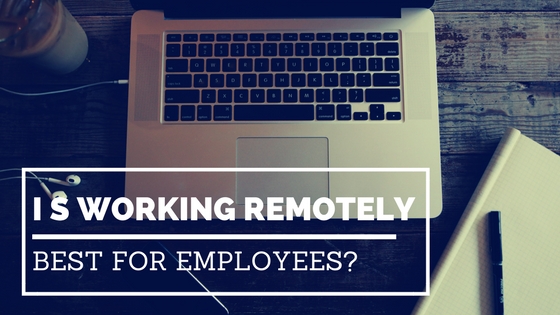One of the biggest craze for people looking for work, especially younger workers, is finding a company that gives them the flexibility to work remotely. It seems like a dream come true for many people that you could get hired full-time with a great company and get all the benefits of being fully-employed, but still have the option of working from home, allowing you to get errands done or spend more time with your family. Many companies are embracing this preference, offering work-from-home days or having employees that are remote full-time. There are plenty of benefits to working remotely and people often reference how it increases employee morale, but few people address the disadvantages of this setup. It needs to be addressed whether or not working remotely is actually best for employees.
Lack of connection
Regardless of how great your remote employees are, there’s a lack of connection between them and the people who are in the office. Without physical interaction and time spent together, it’ll be incredibly difficult to create a strong team who work well on projects together. You’ll have people who are good at doing their jobs independently, but are not used to working with each other in a team setting. Also, if you have a mix of people in the office and people who work remotely, you run the risk of the remote employees feeling left out and dissatisfied with their job.
Hard to hold accountable
There are plenty of remote employees out there who do a stellar job, but there are also lots of people in this world who procrastinate and slack off from their responsibilities. If your employee frequently takes work from home days or is always remote, it can be difficult to gauge how much work they’re getting done. You could check-in with them each day and have them complete a daily schedule, but it ends up making more work for you.
Issues with communication
Everyone knows, no matter whether it’s for professional or personal use, communicating online can cause serious issues. It’s much more beneficial to be able to read someone’s body language and speaking face to face can help the two of you connect. Even with Skype, you have the risk of the signal cutting out and you still lack actual human contact. When you’re working remotely, it’s a constant case of emailing back and forth to ask simple questions that could be solved through a five minute face-to-face conversation.
Blurring of home and work
One of the biggest challenges for remote workers is that home and work begin to blur together. If you want to avoid this issue, it’s strongly advisable that you have a home office you use exclusively to take care of business work and have a set time where you leave that office for the day. Remote workers often get distracted by other people and things around their home and can end up working until late at night, trying to get everything done.

